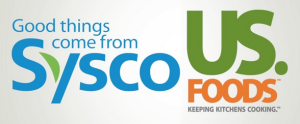

Recently, Sysco Corp has been pursuing a $3.5 billion merger with US Foods. However, the government could be killing this merger, which could leave Sysco with a bill of around $1 billion. This underscores the danger of doing deals that have a good chance of being blocked by antitrust regulators. Sysco is currently the largest food distributor in the US, and has spent more than $400 million so far on a combination of integration planning, financing charges and on defending the transaction in court. To put that into context, Sysco’s net profit for its fiscal year that ended in June of 2014 was $932 million.
the government could be killing this merger, which could leave Sysco with a bill of around $1 billion. This underscores the danger of doing deals that have a good chance of being blocked by antitrust regulators. Sysco is currently the largest food distributor in the US, and has spent more than $400 million so far on a combination of integration planning, financing charges and on defending the transaction in court. To put that into context, Sysco’s net profit for its fiscal year that ended in June of 2014 was $932 million.
If the Federal Trade Commission (FTC), which filed a lawsuit to block the merger in February, ends up having its way, then Sysco will have to pay its No. 2 rival, US Foods, $300 million as a termination fee. Separately, up to $25 million would end up going to Performance Food Group, which has agreed to buy assets to be divested as part of the Sysco-US Foods deal. If the deal doesn’t end up closing by October 8 or is terminated by then, Sysco would incur an additional $265 million in losses, which includes the cost of redeeming $5 billion in bonds set to be used for the acquisition, in addition to associated financing costs that haven’t been booked yet on its balance sheet.
Even a successful deal could come at a hefty price, since prolonged delays have led to higher financing charges and legal advisory fees to fight the government in court. Sysco had forecast that it would close the transaction in the third quarter of 2014 after it announced the deal in December of 2013. Debates between the FTC and Sysco on whether or not this deal will conclude with closing arguments on May 28. So far, it isn’t known when the judge will rule. The potential $1 billion in costs if this merger fails to be completed underscores the dangers companies face when they decide to go forward with an aggressive deal when the US government is taking a more active stance in stopping deals that reduce competition in an industry.
Comcast’s $45 billion bid for Time Warner Cable, which would have combined the two largest US cable operators, collapsed in April from regulatory opposition. Comcast ended up spending $336 million on the abortive bid, although it didn’t have to pay a break-up fee. Indeed, mergers can be expensive, since they’re an investment in a business’ future success. Sysco and US Foods, which is controlled by private equity firms KKR & Co LP and Clayton, Dubilier & Rice LLC, have defended the merger by saying that the market for food distribution is extremely competitive, and that this merger would allow it to capture $600 million in synergies annually three to four years after the deal ends up closing. According to the FTC, merging the two biggest US food distributors would give Sysco a staggering 75 percent of the market for customers like hotel chains, which want nationwide contracts for a broad range of goods, such as food. The FTC says that the dominance of the market would allow Sysco to raise prices. This idea that regulators have been getting tougher could end up making sellers more reluctant to accept takeover offers from big rivals, which could force buyers to either offer a substantial premium or big regulatory break-up fee to convince unwilling targets.
The top antitrust official at the Justice Department, which shares jurisdiction with the FTC and reviews mergers to ensure that they comply with antitrust law, recently expressed frustration with aggressive deals. So far, filings reveal that Sysco has spent around $100 million to finance its planned takeover. Most of these costs were incurred after October, when the company replaced a bridge loan facility with long-term financing for the merger, issuing $5 billion in bonds. In the last two quarters, Sysco has paid roughly $80 million in interest on the debt, as well as another $258 million on integration planning and to hire advisers to defend the deal. Sysco also spent a further $53 million to allow the two companies’ computer systems to communicate with each other. If a deal goes to litigation, legal expenses for an antitrust review can easily top $1 million a month, and could exceed $10 million for the duration of a trial. So far, it’s unclear if the prolonged struggle over the deal has led to some less discernible costs for Sysco; the management of a company can often get distracted by such events, or miss out on other possible acquisitions.